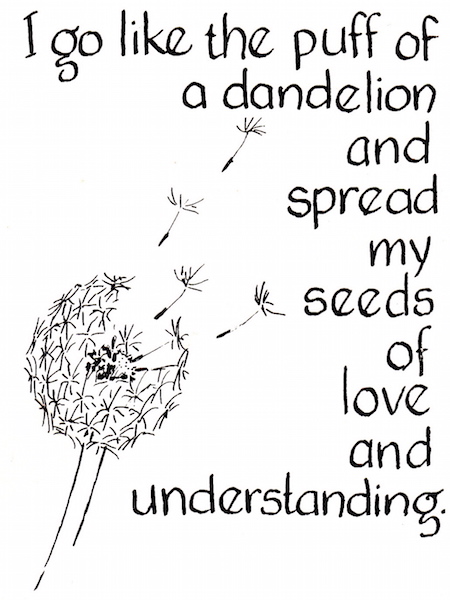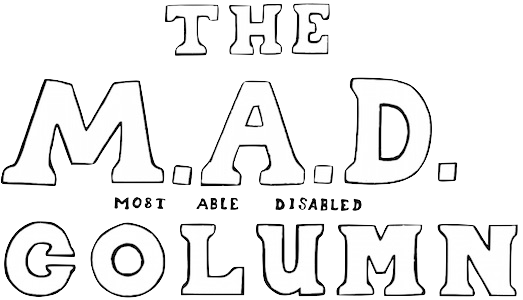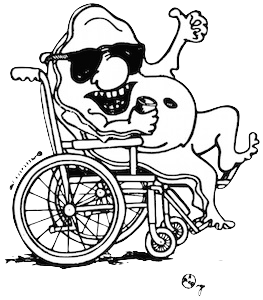
Dandelion from Christmas card designed by Meg Casey
by Meg Casey
Wee Voice Of Experience
Make Own Whopping Mistakes
March 16 1983
Dear Meg;
I have tried time time again to get a close friend to go out with me and others so that the boredom of a "constant" environment doesn't drive her nuts as it would me were our positions reversed. She is great fun. Everyone really likes her a lot, are impressed by her good humor and intelligence and they are genuinely serious when they ask her along. What are your suggestions? I know that she isn't satisfied with things the way they are now.
Dear Worry Wart:
No matter how well intentioned someone's intentions are you simply can't make another person live their life exactly the way that you'd like them to. All that you are entitled to is to get an ulcer over worrying about it for them.
I know that I have given members of my own family a few gray hairs in my day by the choices I've made for myself. Whether those choices turned out to be the right or wrong ones, I was entitled to make my own whopping mistakes and to ignore or take outside advice.
You have to be certain that you are interpreting your relative's situation accurately and not overdoing the role reversal bit (which could quite conceivably be done). It would be awful to suddenly realize one day that you had been cramming your ideas of a fun lifestyle down someone else's throat, all in the name of love. If their own ideas are contradictory they might choke to death on the combination of your ideas and your feet packing them in. It is very important to everyone concerned that you make sure you are correct before proceeding further.
If you are convinced things are as they have seemed all along, there are several suggestions which I could make.
Peer counseling is the first thing I would recommend. Peers share something in common - In this case the counselor and the person to be counseled would both be disabled. Not necessarily having the same disability unless it is specifically desired. They would get together frequently to talk and learn from each other's experiences. They would become friends, sometimes close friends.
If all that is wanted is a social circle, joining civic groups is an excellent way of meeting people. (Accessibility is the only obstacle in most cases when it comes to meeting places.)
However, in order to have any of these ideas be of any good whatsoever your relative has to be willing to go along with it. She has to want it for herself not just to make you happy or to get you off her back.
At the risk of repeating myself in column after column. The most important person who must accept your relative is herself. Until that is done self-consciousness and fear of rejection can hold her spirit prisoner indefinitely.
Human Beings Are Funny Things
January 25 1984
The questions and topics that I have chosen for this column have come from the many people who have written me letters about their concerns and from those I have met out in public as I have been going about living my own day.
Each of these modes of collecting information holds its own individual benefits or rewards. While letter writing can afford to those who choose - the comfortable shield of anonymity - as well as the time to phrase your precise thoughts, doubts and fears perfectly and in as much detail as desired, the chance meeting between people lends a simple spontaneity that can be fun whether someone rushes up in excitement and blurts something out just because they have seen me, or whether they want to throw it at me before they have lost their nerve to ask at all.
These meetings give the added benefit of some form of instant response to the more impatient souls and allows me an opportunity to catch a glimpse of the personality inside the very bold people, or sometimes very timid people, that are given away through body language and facial expressions.
I would be severely pressed to choose my favorite of the two modes for getting material to write about when both hold different and definite clues for me to begin with in my attempt to sort out the appropriate angle for viewing and address a request or problem.
What kind of people ask me questions?
All kinds, sizes and shapes. It doesn't seem to make much of a difference. Human beings are funny things, like nuts (Some of us ARE nuts) Once I strip away the outer shell of the bodies and get down to the people inside I find that every one is mushy or nutty to some degree and hiding their own secret insecurities, many times even from themselves. Those insecurities can then usually be untangled and found to fit into the same typecasted molds that someone else's came from.
The able-bodied people who contact me are either family, friends, acquaintances of a disabled individual or just plain curious. The disabled people who contact me can be broken down into three kinds of groups. Those born with a disability; those disabled by accident or illness; and those who have naturally grown into the category sometime in their sunset years.
The elderly are often grouped with the disabled whether the individuals actually physically fit the classification or not. The cries from within the groups are often in accord with a disgruntled opinion of this kind of herding. Mass herding does not allow individualism nor independence, nor advancement gained through the recognition of an individual's potential and accomplishments.
Example; Little people are not always "little" people; disabled people are not all "retarded" intellectually; elderly people are not all "senile."
(So speaketh the wee voice of experience!)
Heard this one? "Do onto others as you would like them to do onto you."
Meg's description of writing where the person is anonymous and is a different experience from interacting with others echoes a critique of online comments. She shows a deeper understanding of the subtle ways we communicate without words. Depending upon a condition, body language clues may prove difficult to properly discern in the handicapped or for them to accurately read others.
Publication Options
December 28 1983
I do hope that my efforts with this column have done some good somewhere for somebody. If one person has been helped to see more clearly the hidden potential that every individual has inside themselves to achieve success or even more simplistically - to be a friend - then I have accomplished a great deal.
I have certainly enjoyed writing this weekly column tremendously. I too have learned from the experience. The many people who have shared their difficulties with us and trusted me to research the answers to their questions have helped me to grow personally through a greater understanding of other's situations in life.
Thoughts about national syndication for this column I must confess have been included in a few of my own dreams for the future. Taking one step at a time I'll have to find the proper way to go about such a proposition. (All suggestions gratefully accepted!)
As far as whether or not I am going to write a book. … OK I don't know, perhaps. An endeavor of this nature has been suggested repeatedly to me by doctors and parents and others who have either read or heard of me over the last few years. At the moment tackling such a monumental tackling seems a bit intimidating. I haven't figured what angle I would begin on nor am I quite sure what information people are looking for from me that would fill a book! (All suggestions gratefully accepted here too!)
I sincerely hope that everyone will continue to write or contact me with any questions they need answers to. I fully intend to continue doing the work I have been at in this column because I really enjoy this sort of personal contact.
Whatever my future holds know that I wish the best for you and yours.
This column was written when Meg had only a year's worth of material. Meg continued to write approximately 134 "Most Able Disabled" handicapped access columns from December 1982 to May 1985. Some of the 125 located were from Meg's original handwritten notes. Edits were kept to a minimum to present complete articles when possible or portions of material not too dated and felt to be still relevant. Hopefully, the compilation and online publishing of these articles begins to serve Meg's wish of eventual syndication or for a book.



